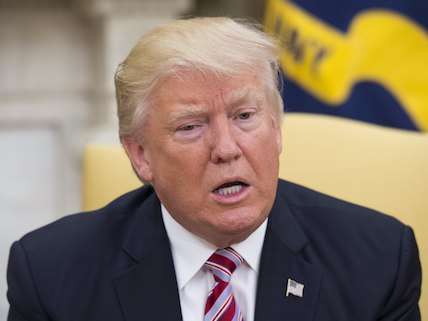Frustration with Political Correctness Was a Huge Predictor of Whether You Voted for Trump
After party affiliation, nothing pegged Trump voters as well as opposition to P.C. culture.

Was Donald Trump elected to the presidency in part because of a backlash against political-correctness-run-amok? Survey says yes.
I have previously suggested that anger about P.C.-sensitivity and perceived liberal overreach was a strong motivating factor among Trump voters—many of them have told me so, in fact. And survey data from ClearThinking.org clearly supports this conclusion.
According to the website—the project of mathematician Spencer Greenberg—believing "there is too much political correctness in this country" was the second most reliable predictor of whether a given person intended to vote for Trump. The only better predictor was party affiliation: despite an abnormal campaign featuring an abnormal candidate, it remained the case that the overwhelming majority of Republicans voted for the Republican candidate, and the overwhelming majority of Democrats voted for the Democratic candidate.
But being anti-P.C. correlated more strongly with being pro-Trump than just about anything else: it beat out social conservatism, protectionism, and anti-immigration as predictive tendencies.
"Nowadays, as the right sees it, the left has won the culture war and controls the media, the universities, Hollywood and the education of everyone's children," Jonathan Haidt, a psychologist at New York University, told Politico in the recent article that made me aware of Greenberg's survey data. "Many of them think that they are the victims, they are fighting back against powerful and oppressive forces, and their animosities are related to that worldview."
It's always tempting to make too much of this information, and the truth remains that the election was so close—just 100,000 votes across three states made the difference—a number of factors could all share some responsibility for the outcome. Whenever anyone says this is why Trump won, they are often telling only part of the story. That's as true for P.C.-backlash as it is for the James Comey letter.
Nor does this data validate the claim that political correctness is a huge problem, or a problem unique to the left. Just because Trump voters feel like they are being suffocated by liberal political correctness does not make it true.
But it does suggest that playing directly into white, working class America's persecution complex is a terrible strategy for the #Resistance. When progressives shout down conservative speakers and attack their defenders, when they launch social media witch hunts against dissenters, and when their advocacy organizations compromise basic liberal principles in order to punish members of the out-group, they give ammunition to people who believe—quite wrongly—that Trump is a brave truth-teller whose tell-it-like-it-is attitude maintains a sort of safe space for the un-woke.
For more on this subject, read my response to Jacob T. Levy, who is critical of the notion that anti-P.C. sentiments mattered a great deal in the 2016 election. Taking issue with my writings, Levy wrote in December, "A lot of butterflies flapped their wings to bring about the November 8 result, but we have particularly little reason to think [opposition to political correctness] was one of them." I leave it to the readers to decide whether that holds up.


Show Comments (65)